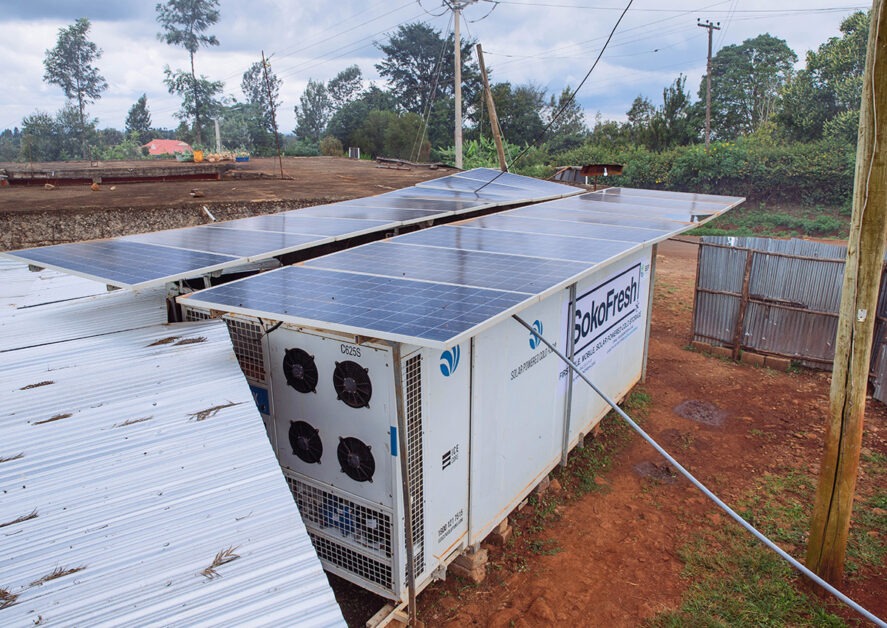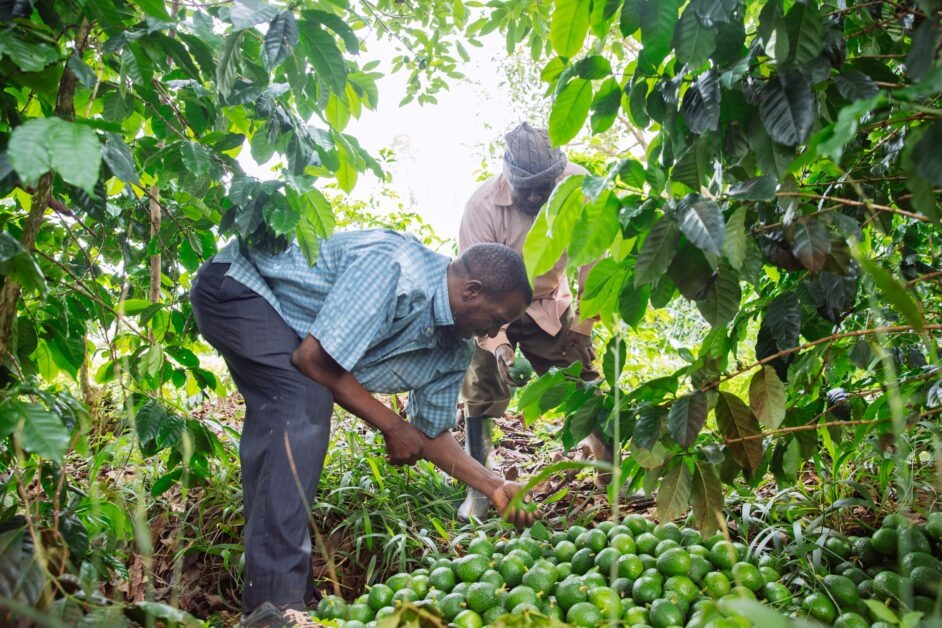Solar-powered cold storage supports resilient food systems and limits post-harvest crop losses. With TEA funding, SokoFresh piloted a business model to bring these technologies straight to Kenya’s rural and often off-grid smallholder farmers, reducing spoilage to just 2%.
Across sub-Saharan Africa, up to 38% of fruits and vegetables spoil before reaching the consumer. This level of spoilage can be prevented, in part, through cold storage, especially in hotter climates. When farmers don’t have access to cooling to keep produce fresh, many will see substantial post-harvest losses – and financial losses. Horticulture, especially fruits and vegetables, is a vital part of Kenya’s economy, providing both domestic food security and foreign currency through exports.
Solar-powered solutions to preserve the quality of horticultural produce exist. But with a 5-tonne solar cold storage unit costing about $30,000, their cost is often prohibitively high for smallholder farmers. Instead, they are under pressure to sell produce quickly at lower prices to avoid spoilage.
Enviu, a Dutch venture building firm, ideated SokoFresh to help reduce post-harvest loss of horticultural produce. The Kenya-based company created a one-stop shop for cold storage and market linkage to give farmers timely access to markets. When their crops are ready, farmers alert SokoFresh, which purchases the produce at competitive rates. The harvest is then stored in solar-powered cold storage units to maintain freshness, which allows the produce to be sold at a higher price. After the produce is sold, SokoFresh deducts a small fee for storage and market access before sending the remaining profits to the farmer. This business model ensures farmers don’t have to accept low offers to rush their produce to market.
The problem lay not in the availability of a viable technology, but in figuring out a business model that makes cold storage accessible, affordable and reliable for rural smallholders.
Denis Karema, CEO, SokoFresh

Proving the concept on the ground
The concept was promising on paper, but its operations and commercial viability needed testing on the ground. With initial support from TEA via Powering Renewable Energy Opportunities (PREO), SokoFresh set up demo sites across horticultural value chains in Kenya, where 80% of horticultural produce comes from smallholder farmers.

We had a very solid plan and feasibility study, but it was all on paper. Not yet a moment in which an investor or debt provider dares to step in.
Denis Karema, CEO, SokoFresh
SokoFresh purchased two off-grid cold storage units for the first pilots in Makueni and Muranga: two agricultural counties outside Nairobi.
The 2020 pilots engaged 1,500 smallholder farmers in the mango, avocado and French bean value chains, trading over 110 tonnes of produce. Farmers were paid upfront at harvest, with a second payment following the final sale. These trials proved a successful business model for Sokofresh and farmers, who saw their income rise by around 20%.
After selling the avocados through SokoFresh, I was able to buy a water pump. There is now water supply in my whole house
Local farmer

As a result, it became easier to convince farmers, buyers and potential investors of the need and viability of SokoFresh’s one-stop cooling shop. The company closed its first seed investment round in 2023 and became the first company to receive investment from Acumen’s $25 million investment Initiative PEII+, an initiative supported by UK aid via TEA and other impact investors. The company is now on its way to owning over 30 portable cold storage hubs across Kenya.
Cold storage is just one way to reduce food spoilage. With further PREO funding, SokoFresh amplified the impact of cold storage by developing and scaling its market linkage platform. A simple platform now updates farmers on optimal harvest times to limit food waste, and market prices, so growers can predict the end price of their sold produce and negotiate on that basis. It gives farmers greater visibility into their potential earnings and allows them to negotiate prices from a more informed position.
The support was critical for us to develop an investable business model and product market fit. TEA personnel have also been helpful in connecting us to other stakeholders and opportunities to scale our business and impact.
Denis Karema, CEO, SokoFresh
Following successes in the horticulture value chain, SokoFresh has been exploring additional customer bases, including poultry and fish farming. The company piloted business models to reduce post-catch losses in Kenya with a second round of PREO grant funding, and plans to trial a lease model for third-party suppliers in various fishing areas.
0
Since its 2020 pilot, over 14,500 farmers have been onboarded.
0%
Farmers’ income grows by 20% on average.
0%
SokoFresh has reduced post-harvest loss to as low as 2%, which is significantly lower than the 30-40% of loss common across Kenya’s horticulture value chains.
- 2